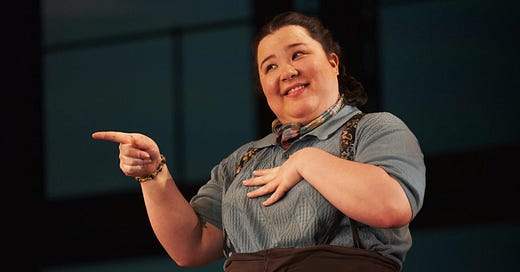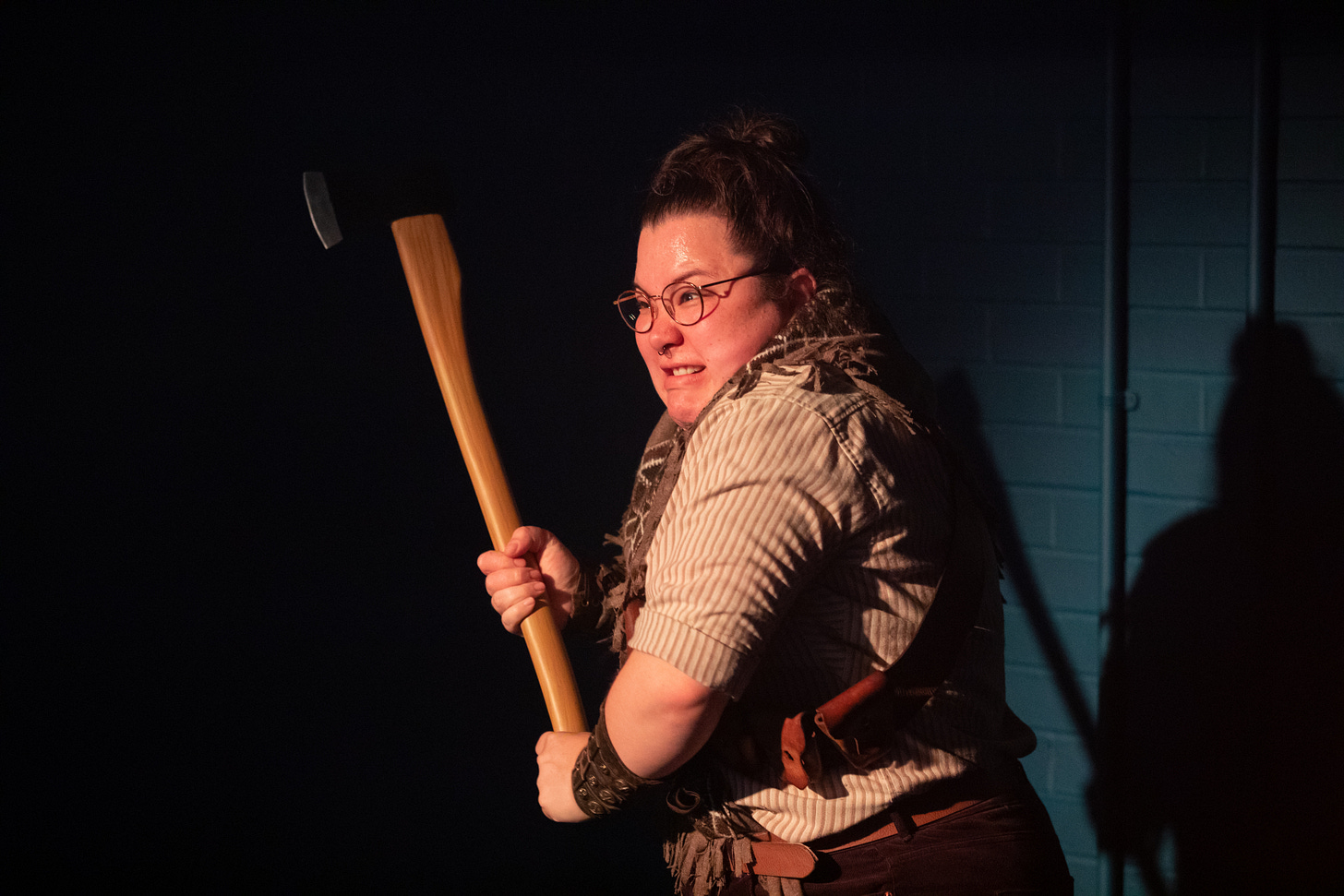Bea Webster smashes stereotypes with sign language.
The actor, writer and drag artist wants to tackle some more Shakespearean roles. Plus: this newsletter is now weekly.
Hello, and welcome to The Crush Bar, a weekly newsletter about theatre written by me, Fergus Morgan.
Each issue features an interview with an exciting, emerging theatremaker - and gives them a chance to be explicit about where they want to go and what help they need to get there. Maybe you, reader, can give that help to them, or put them in touch with someone who can.
You can read more about why I’m doing this here, and you can sign-up to get it delivered straight to your inbox using the button below…
Before we get to this issue’s interview, an announcement: hitherto, I have sent out The Crush Bar once a fortnight. From now on, it is going to be once a week. That’s right, a new issue, featuring a new interviewee, will land in your inbox every single Friday.
That means, though, that I need your help more than ever. There are three things you can do to help: subscribe, share on social media, and support via Ko-Fi. There’s more info on how to do each of those things at the bottom of this issue. Thanks in advance.
For a long time, actor, writer and drag artist Bea Webster did not think a career in theatre was possible.
They are Deaf, queer, non-binary, mixed-race and working class – on Twitter, they joke that they “literally tick every box” – and, for a long time, thought that meant they could not pursue the performing arts professionally.
“Lots of external factor affected that,” Webster says. “The arts not being especially valued at school. Seeing white actors play Asian characters in yellowface. Seeing actors crip up to play Deaf characters. My voice being mocked. Coming from a working class background. I just thought a person like me had no place in the acting world.”
Webster, 31, was born in Bangkok and grew up in Glasgow, where they are still based today. As a child, they loved getting on stage and were part of Scottish company Solar Bear’s Deaf Youth Theatre, but it was only after completing an MA in Sustainable Engineering – “I know, I know, what was I thinking?” – that they were persuaded to pursue performance instead.
With financial support, they signed up to the Royal Conservatoire of Scotland’s BA Performance in British Sign Language and English - the only course of its kind in Europe - and spent three years training. It was, they say, “easily the best decision I have made, and my achievements since then have proved it.”
“I just thought a person like me had no place in the acting world…”
Webster graduated in 2018. Their first professional part came in Autumn of that year, in Red Ladder Theatre’s production of Mother Courage. More work – writing, acting, and performing as a drag artist – soon followed, and in 2020 Webster was cast in the Royal Shakespeare Company’s production of The Winter’s Tale, alongside fellow Deaf actor (and interviewee of The Crush Bar) William Grint.
“I remember my audition for the RSC,” Webster says. “It was quite last minute, and the only time I had to prep was on the five-hour train journey to London. I was signing everywhere, and kept hitting people as I walked down the aisle. I screamed when I got the email saying I’d got the part, and then I cried. I was so surprised that, a year and a half after graduating, this Deaf, mixed-race, queer, working class actor had got into the RSC. I still have to pinch myself.”
It ultimately turned out to be a “bittersweet” experience. Lockdown meant the final production was never seen by a live audience, but it was filmed and broadcast on BBC Four – it is still available on iPlayer – and Webster still had “a wonderful time” working with the cast and creative team. Not spending several months in Stratford gave them the chance to do some other work, too: writing on of the National Theatre of Scotland’s Scenes For Survival short films, and appearing as part of Pitlochry Festival Theatre’s online winter ensemble.
At the moment, Webster is appearing in Polka Theatre’s production of Red, a loose adaptation of Little Red Riding Hood aimed at children aged 6-12, and intended to be accessible to audiences who are Deaf, Hard of Hearing, or for whom English is not a first language. It has an all-Deaf cast, with Deaf and Disabled artists on the creative team. Such inclusivity is “brilliant”, says Webster, but it is still far from the norm.
“It is not my Deafness that makes it tricky, it is the societal barriers against Deaf people that makes it tricky,” Webster says. “I have to challenge a lot of misconception and stereotyped perception, which is exhausting. I am very fortunate, though, to have brilliant agents who advocate for me, and to have such a supportive family, spouse, and friends.”
“There is a serious lack of representation on stage and on screen,” they continue, when asked what drives them to keep breaking down these societal barriers. “It’s not often we see a Deaf character, an Asian character, a trans/non-binary character, especially not one full of stereotypes. I really want to be a part of changing that.”
What do you want to do?
“There are so many roles I’d love to play, but I don’t really mind as long as it’s not stereotypical. I’d love to play Hamlet, Lady Macbeth or Titania, especially as my authentic self as a Deaf, queer, non-binary person. Shakespeare has been done so often that it needs a fresh take. We need to challenge the text more.”
“I haven’t been on TV or in a film, yet, and that is something I’d love to change. I really love fantasy, sci-fi, witchy, supernatural stuff, and I’d love to bring my lived experiences to those kind of shows. You really don’t see many Deaf/Disabled people in those roles, and I’d love to be a part of changing that.”
What support do you need to get there?
“The biggest thing is awareness and perception, especially of stereotypes. I have auditioned for roles and been told that I didn’t look white enough, or Asian enough, or that I didn’t sound or look Deaf enough, whatever that is supposed to mean. I feel like this gets in the way of casting, which is already hard enough as it is. More roles should be open to actors from diverse backgrounds.”
How can people find out more about you?
“People can find me through my agents, Brennan Artists, or they can follow me on Twitter where I share my work and announce my upcoming stage performances.”
“Some of my work is available online, too: the National Theatre of Scotland’s Holding/Holding On; Little Cogs’ Funny Peculiar; Wonder Fools’ Is This A Fairytale?; Damn It Bevvy! for Deaf Explorer; Squeezy Yoghurt, also with the National Theatre of Scotland; and The Winter’s Tale with the RSC.”
The Crush Bar is totally free and unfunded at present, so anything you can do to support it is hugely appreciated. There are three helpful things in particular: you can subscribe using the button above, you can share it, either on social media or by forwarding it to anyone who might be interested, and you can donate to my Ko-Fi account using the button below.
If you want to get in touch with me to ask about anything, or to suggest someone who deserves a shout-out in this newsletter, you can reach me on Twitter - I’m @FergusMorgan - or by simply replying to this email. That’s all for now. Back next week. Thanks for reading.
Fergus Morgan




